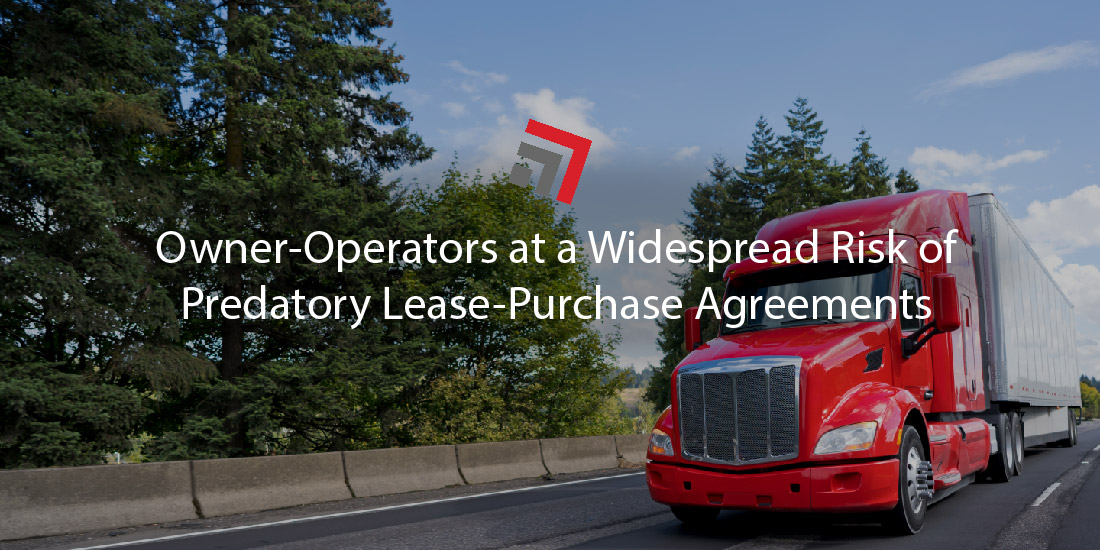A study led by the Consumer Financial Protection Bureau, an independent U.S. government agency responsible for consumer protection from banks, lenders, and other financial institutions, unearthed an unsettling conclusion impacting professional truck drivers.
The yearlong study has revealed that there is widespread risk for owner-operator truck drivers being rushed into signing what the agency defines as predatory lease-purchase agreements. In other words, agreements which hide or fail to clarify the details drivers are signing to pay.
An owner-operator is a self-employed truck driver who owns and operates their own commercial heavy-duty truck. They act as independent contractors, available to accept jobs from various trucking companies and carriers, while setting their own hours. The startup costs, mainly purchasing or leasing their trucks and other equipment, can be an intimidating venture.
Study assists FMCSA truck-leasing task force
The CFPB study was presented during a Federal Motor Carrier Safety Administration (FMCSA) truck-leasing task force virtual meeting last month. CFPB was obliged to assist the task force with its investigative work.
The task force is represented by nine members—including attorneys, an owner-operator representative, logistics experts, and trucking company associates. The focus of the group is to examine certain leasing agreements that adversely impact owner-operators, as well as small trucking companies.
By late 2024, the task force will present finalized findings to key government decision-makers, including both transportation and labor secretaries as well as relevant congressional committees.
The CFPB study revealed well-documented insights of unfavorable agreements. While these findings were not limited to owner-operator trucking agreements alone, it still represents the challenges this labor sector has when dealing with certain financial entities.
- Because debts are inextricably linked to a worker’s employment, the worker’s ability to repay the debt is controlled by the issuer of the debt itself.
- Workers may be entirely unaware they have agreed to take on debt to secure their job.
- Workers may feel that they are powerless to review or negotiate the agreements before accepting a job, especially workers with limited experience in a new occupation and workers who are financially vulnerable.
- Employers may misrepresent the value and nature of the employer-driven debt, work conditions or the earnings of the prospective jobs.
- Employers may restrict workers from leaving their jobs because of the high cost of repaying financial costs related to debt.
The above revelations took into account the CFPB’s wide-ranging investigation of several industries. This included airline pilots to pet groomers. However, the agency noted that many stories of financial hardship came from the owner-operator truck drivers.
“We heard everything from lower earnings to damaged credit scores to even some stories of [owner-operators] taking on additional obligations in order to repay their employers,” Emma Oppenheim with the CFPB said.
Oppenheim also acknowledged their findings with the owner-operator occupation prompted the agency to stay involved with the FMCSA task force: “Given what we had learned about trucking in the course of this study and given that we stayed on the task force as advisory members, we were invited to present broadly on the findings of the report, and specifically what we heard about the trucking industry.”
Final Thoughts
Truck driver advocacy group Owner-Operator Independent Divers Association has long pushed for the FMCSA to address predatory lease-purchase agreements.
OOIDA Director of Federal Affairs Jay Grimes said, “The consensus of the task force thus far has indicated that these deceptive types of contracts have no beneficial role in trucking…The presentation from CFPB acknowledged there are serious problems with a business issuing debt and also controlling the worker’s ability to repay the debt.”
The FMCSA task force will continue to seek additional data on lease purchase agreements, while considering new qualifying criteria for said agreements going forward.
Please contact us if you have any questions regarding this topic or any others in domestic logistics. In addition, stay up to date with weekly headlines from both trucking and rail via our Road Map newsletter.
More blogs similar to this:



Recent Comments